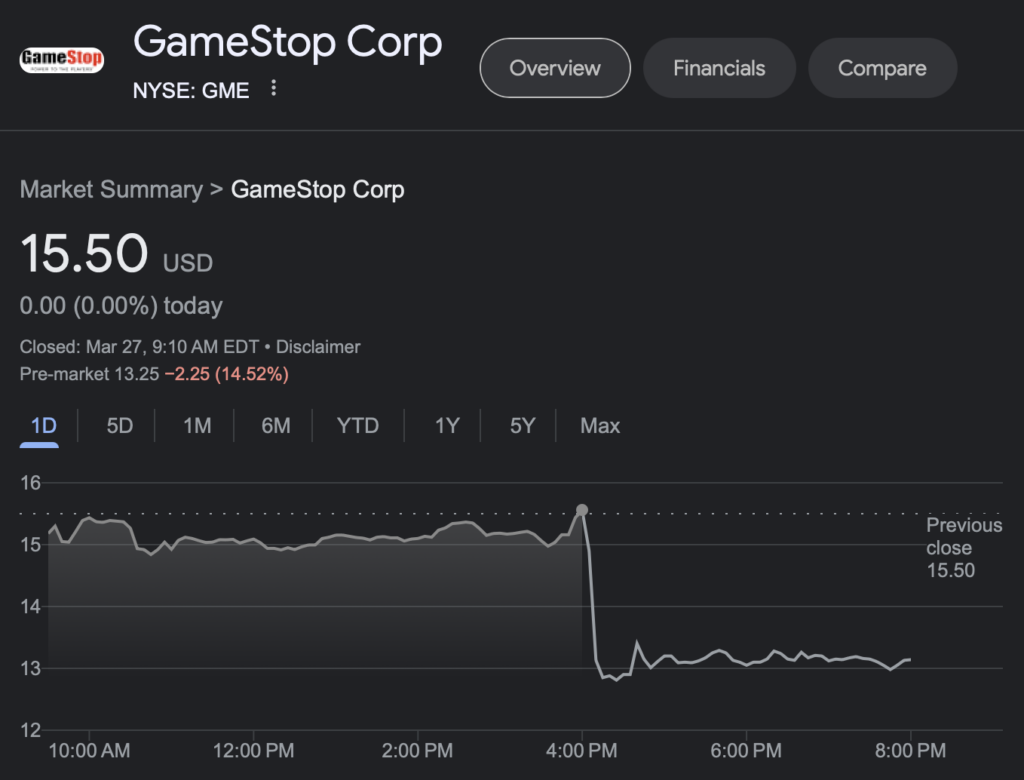GameStop Craters On Q4 2023 Revenue Decline, Job Cuts
In a significant blow to GameStop (NYSE: GME), shares of the brick-and-mortar video game retailer nosedived as much as 18% before Wednesday’s bell.
This plunge follows the company’s report of a fourth-quarter revenue decline, attributed to a reduction in consumer spending and mounting competition from e-commerce giants. The Grapevine, Texas-based company also disclosed a round of job cuts as part of cost-saving measures amidst economic uncertainty.

The fourth-quarter revenue slump, coupled with the announcement of job reductions, underscores the challenges faced by GameStop in navigating the evolving retail landscape.
During the quarter ending on February 3, the company reported adjusted earnings of 22 cents per share, falling short of analysts’ projections of 30 cents per share. Revenue for the period amounted to $1.79 billion, a decrease from $2.23 billion in the preceding year, and it missed the consensus estimate of $2.05 billion.
Delving into the specifics of the video game retailer’s revenue, sales from hardware and accessories reached $1.09 billion, reflecting a 12% year-over-year decline, while software sales experienced a notable slump of 31% to $465 million.
It is also worth noting that the company said it will not be holding a conference call with analysts, which usually accompanies an earnings release.
Throughout this year, GameStop’s stock had already experienced a decline of nearly 12%. With a current count of 4,169 stores compared to 4,413 a year ago, GameStop is feeling the squeeze of shifting consumer preferences and market dynamics.
Once lauded as the pioneer of meme stocks, GameStop’s fortunes have taken a sharp turn. Investment director Russ Mould from AJ Bell commented on GameStop’s situation, noting the lack of detailed commentary from management and the absence of a post-earnings conference call, which he interprets as “the management is hiding under a rock.”
Wedbush Securities analyst Michael Pachter emphasized the challenges posed by the digital transformation of the gaming industry, highlighting the dwindling appeal of physical retail in the face of instant digital downloads. This sentiment aligns with broader trends observed in the sector, as evidenced by lackluster earnings from U.S. videogame publishers Take-Two Interactive Software and Electronic Arts.
“Revenues are highly unlikely to rebound unless management figures out a way to drive store traffic,” Pachter said.
In a bid to weather the storm, GameStop has implemented cost-reduction measures, with the company’s recent financials revealing a decline in expenses, primarily attributed to reduced labor costs and marketing expenditures.
As outlined in its annual 10-K report, the company had approximately 8,000 full-time salaried and hourly associates at the beginning of February, along with between 13,000 and 18,000 part-time hourly associates globally. This marks a decrease from around 11,000 full-time salaried and hourly employees and between 14,000 and 27,000 part-time hourly staff in 2023.
Furthermore, GameStop has ceased operations in Ireland, Switzerland, and Austria as part of its strategic efforts to achieve sustained profitability. Despite these efforts, doubts persist about GameStop’s long-term viability, with analysts cautioning that continued cost-cutting may not be sufficient to offset declining sales.
Additionally, the appointment of Daniel Moore as principal financial officer comes amidst ongoing efforts to stabilize the company’s financial operations. Moore had previously served in an interim capacity since August.
Information for this briefing was found via Reuters, Investopedia, and the sources mentioned. The author has no securities or affiliations related to this organization. Not a recommendation to buy or sell. Always do additional research and consult a professional before purchasing a security. The author holds no licenses.




